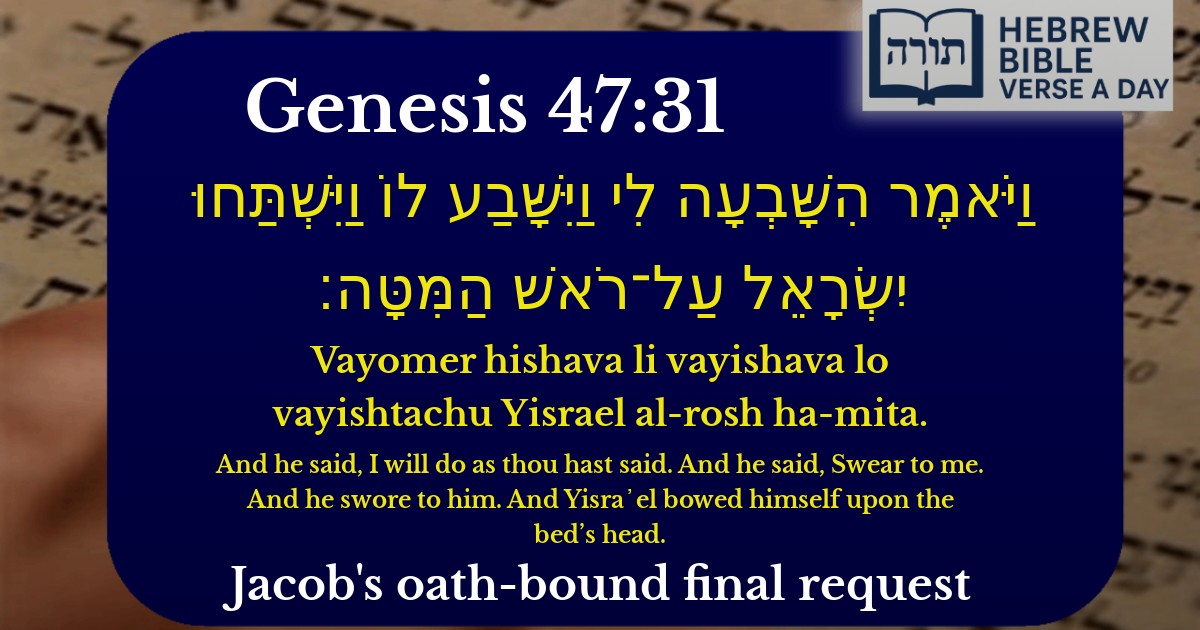Join Our Newsletter To Be Informed When New Videos Are Posted
Join the thousands of fellow Studends who rely on our videos to learn how to read the bible in Hebrew for free!
Hebrew Text
וַיֹּאמֶר הִשָּׁבְעָה לִי וַיִּשָּׁבַע לוֹ וַיִּשְׁתַּחוּ יִשְׂרָאֵל עַל־רֹאשׁ הַמִּטָּה׃
English Translation
And he said, I will do as thou hast said. And he said, Swear to me. And he swore to him. And Yisra᾽el bowed himself upon the bed’s head.
Transliteration
Vayomer hishava li vayishava lo vayishtachu Yisrael al-rosh ha-mita.
Hebrew Leining Text
וַיֹּ֗אמֶר הִשָּֽׁבְעָה֙ לִ֔י וַיִּשָּׁבַ֖ע ל֑וֹ וַיִּשְׁתַּ֥חוּ יִשְׂרָאֵ֖ל עַל־רֹ֥אשׁ הַמִּטָּֽה׃ <span class="mam-spi-pe">{פ}</span><br>
וַיֹּ֗אמֶר הִשָּֽׁבְעָה֙ לִ֔י וַיִּשָּׁבַ֖ע ל֑וֹ וַיִּשְׁתַּ֥חוּ יִשְׂרָאֵ֖ל עַל־רֹ֥אשׁ הַמִּטָּֽה׃ {פ}
🎵 Listen to leining
Parasha Commentary
📚 Talmud Citations
This verse is quoted in the Talmud.
📖 Megillah 16b
The verse is referenced in a discussion about the significance of Jacob bowing on the head of the bed, relating to the concept of divine presence (Shekhinah) being at the head of a sick person.
📖 Shabbat 12b
Mentioned in the context of discussing the proper conduct and reverence when visiting the sick, drawing a parallel to Jacob's action.


Context of the Verse
This verse (Bereshit 47:31) describes Yaakov Avinu's request to Yosef to swear that he will bury him in Eretz Yisrael, followed by Yaakov bowing at the head of the bed. The scene occurs during Yaakov's final days in Mitzrayim, where he seeks assurance from Yosef regarding his burial in the land of his fathers.
Yaakov's Request for an Oath
Rashi explains that Yaakov insisted on an oath from Yosef because he suspected that Pharaoh might prevent Yosef from fulfilling this request. By taking an oath, Yosef would be bound by a sacred obligation, making it harder for Pharaoh to interfere. The Midrash (Bereshit Rabbah 96:5) adds that Yaakov sought an oath to ensure Yosef's commitment, as he foresaw potential delays or obstacles.
The Significance of Bowing on the Bed
The act of bowing at the head of the bed is interpreted in several ways:
The Bed as a Symbol
The "head of the bed" (רֹאשׁ הַמִּטָּה) is interpreted allegorically by the Zohar (1:231a) as representing the spiritual state of Yaakov. Just as the head governs the body, Yaakov's righteousness and connection to Hashem governed his entire being, even in his final moments.
Yosef's Oath and Its Implications
The oath taken by Yosef is significant in Jewish law (halacha). The Rambam (Hilchos Shevuos 1:2) discusses the gravity of oaths, emphasizing that they create a binding religious obligation. Yosef's fulfillment of this oath later (Bereshit 50:5-6) demonstrates his unwavering commitment to his father's wishes, setting an example of kibud av (honoring one's parent).